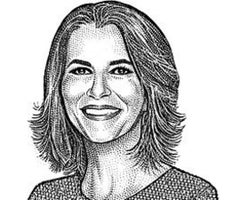MI SELECCIÓN DE NOTICIAS
Noticias personalizadas, de acuerdo a sus temas de interés

China used its United Nations Security Council veto in February to knock down a resolution condemning the fraudulent May 2018 Venezuelan presidential election and calling for new elections and international humanitarian aid for the country. The resolution was backed by France, the U.K. and the U.S., but the veto was especially painful for the Venezuelan people and their South American neighbors.
Russia also voted to block the resolution, but it might not have done so without China’s cover. Vladimir Putin is wary of being isolated from the international community.
The China-Russia veto gave dictator Nicolás Maduro and his Cuban handlers assurance that the U.N. would not intervene in Venezuela. Since then the country’s downward spiral has accelerated. Some 50 democracies have recognized interim President Juan Guaidó as Venezuela’s legitimate leader, but he has been unable to begin his work to restore order. Power outages have exacerbated shortages of food, water, gasoline and medicine. Malnutrition has been rampant for years. Now hospital patients are dying and the danger of mass starvation is real.
There is a growing cry from Venezuelans for U.S. military intervention. Americans are accused of turning their backs on humanity because Washington is reluctant to start a shooting war to topple Mr. Maduro.
The Lima Group of 13 Western Hemisphere countries-not including the U.S.-supports Mr. Guaidó but is prominently opposed to the use of force. Yet it also seems reluctant to confront China for its support of Mr. Maduro. That may be the bigger problem.
Beijing spreads a lot of money around the region as part of its Belt and Road initiative for gaining geopolitical influence. It’s a mark of that strategy’s success that China is scheduled to host the annual meeting of the Inter-American Development Bank, in Chengdu later this month. The U.N. veto notwithstanding, a official of the bank told me by email last week that it has “not contemplated cancelling” the meeting. China offered to host, the official wrote, and the IDB board of governors “unanimously approved the decision at our annual meeting in Asunción, Paraguay, in March 2017.” For the IDB, it’s China or bust.
This is troubling, since without China’s support, Mr. Maduro might already be gone. The dystopian Venezuela he created is beyond repair. Even Mr. Maduro seems to have accepted that. On Monday he called on the Cuban-trained paramilitary known as colectivos to take up arms to defend the Bolivarian revolution. It was the clearest signal yet that he fears the armed forces will betray him.
As the country collapses, some military are rumored to be looking for an escape hatch. In an interview with a Miami radio station last week, U.S. special envoy Elliott Abrams was asked if Mr. Guaidó and his team were talking to “many military.” He said yes and added that many “understand that the Maduro regime is a disaster for the country and for themselves” but are afraid to act.
This terror spread by Mr. Maduro and Cuba is the barrier to success. Yet neither China nor Russia has been given reason to believe that there will be a price to pay in the region for supporting it.
Bogotá is notably soft on China. Colombia has everything to lose if Mr. Guaidó and the opposition are defeated. It has already received more than one million Venezuelan refugees, who are straining public services. Should the Venezuelan spring fail, millions more can be expected to flee. The risks are sky-high, but you wouldn’t know it from the actions of Colombian President Iván Duque.
He is a longtime admirer of China’s authoritarian regime. While working for the Inter-American Development Bank in 2012, he wrote an article in the Colombian business publication Portafolio lavishing praise on the Central Committee of the Chinese Communist Party for its top-down planning based on culture and creativity.
More recently he has criticized China and Russia for their support of Mr. Maduro. But talk is cheap. What matters is what Mr. Duque does, and he has decided to go to Chengdu. The IDB says that while “several Latin American and Caribbean presidents are expected to attend,” none except for Mr. Duque have yet confirmed. IDB President Luis Alberto Moreno, a former Colombian ambassador to the U.S., is also on board.
This is all about money, like the decisions by the Dominican Republic, El Salvador, Panama and Costa Rica to break relations with Taiwan and cozy up to China.
On March 3 the Washington Post reported that Mr. Duque “said countries aligned with Guaidó, particularly the United States, need to persuade China and Russia that it is in their interest to reject Maduro.” In other words, while he and Mr. Moreno are hobnobbing with the Chinese in Chengdu, the U.S. is assigned the task of solving the problem of Chinese intervention in South America. In New York we call that chutzpah.
Note to Venezuelans: If you’re feeling abandoned, look to your neighbor who is putting greed above human decency.
El modelo acordado prevé que el Estado de Chile reciba hasta 70% del margen operativo asociado a nueva producción entre 2025-2030
El ministro de Economía Luis Caputo dijo recientemente que el país cumplirá con sus obligaciones y que no tienen pensado hacer una colocación de deuda en el extranjero para enfrentar el pago
"Vamos a estar entre los 36 y 37 °C en Montevideo. En el suroeste, fundamentalmente sobre Soriano y Colonia, estamos hablando de más de 40 °C", aseguró el meteorólogo Mario Bidegain